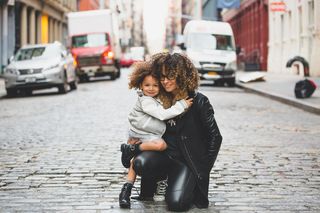Friends
It Takes a Village: 4 Lessons on Friendships and Parenthood
How and why our friendships change as a new parent.
Posted June 27, 2018

The best friendships are those that are stable. Unshakable. The ones that withstand the curveballs life throws our way. But the reality is that friendships can and do change drastically during big life changes and transitions. Never is this truer than during parenthood. Some of these changes can lead to a sense of distance that may be difficult to manage or accept. Others bring us closer to our friends in some fairly unexpected ways. And although we each experience our roles as parents and as friends differently, there are common threads and lessons that connect us all.
1. The support we receive from friends matters more than ever
Parenthood can be one of the most exciting, exhausting, and overwhelmingly meaningful experiences in life. And although we’re constantly surrounded by this wonderful new person, it can also feel incredibly isolating. There are days when we might find ourselves stuck at home or yearning for some adult conversation. There will also be those times when we struggle to figure out the “right” way to handle a new parenting challenge: What exactly is sleep training? What’s the best way to be consistent with limit setting? How can I help my child to be more assertive or confident? It's likely in these moments that the meaning behind the saying “It takes a village” is clearest. Having someone we can turn to for practical support, information, or friendly suggestions (unsolicited parenting advice is rarely appreciated!) and lean on during the more difficult and trying times can make all the difference when it comes to managing the never-ending ride of parenthood.
It also helps to have someone to celebrate the small wins with, whether it’s a new milestone met or just getting that extra hour of sleep. And our friends offer a healthy dose of realism (Parenting is hard, you don’t have to always love it, it’s okay to miss your former life, and it’s definitely okay to seek support) that is so helpful for coping with the overwhelming sense of guilt, perfectionism, and even anxiety or depression that so many new parents experience—contrary to societal expectations, both mothers and fathers can experience postpartum depression. What’s more, being able to offer our support in return helps us to feel connected to a larger community and to build confidence as a new parent.
Lessons Learned:
- While becoming a parent can change our friendships, it also happens to be one of the times when we need our friends the most.
- Turning to good friends for support, advice, and encouragement can make the challenges of parenthood more manageable and the triumphs more meaningful.
2. Maintaining our existing friendships will be difficult
There are so many reasons why holding on to our friendships can be a challenge when we become parents. Practically speaking, it can limit the amount of time we spend with our friends, the types of activities we’re able to do together, or the topics that get discussed in casual conversations. Leaving the house altogether can also feel like a hassle and it becomes so easy to convince ourselves that it’s just not worth leaving the safety and comfort of our nest.
We might also start to feel like we have less in common with our friends than we used to which can make it harder to stay in touch, especially with those who are in a different life stage. At the same time, we might find ourselves growing closer to other acquaintances who are parents themselves.
It’s not uncommon for friends to worry about being abandoned or left behind. And it’s worth noting that this can go both ways; just as you might feel like you’re missing out on activities that aren’t child friendly, a friend might be feeling left out from social gatherings with other parents. Feelings of guilt (e.g., about not having enough time to spend with your friends, or not enjoying spending time with friend’s children) or even jealousy or envy (e.g., whether it’s wanting a child or missing one’s “carefree” life before children) can also creep up. These struggles can be even more delicate when a close friend is struggling with challenges related to infertility. And personal experiences have a way of creating problems in our friendships when they are overlooked or minimized.
Being able to navigate these changes largely rests on our willingness to recognize that these kinds of experiences are normal, and our ability to be open and honest, both with ourselves and our friends. It also helps to remember why investing in our existing friendships is so helpful:
They serve as an important reminder of who we are outside of our role as parents.
Lessons Learned:
- Changes and fluctuations in friendships are normal and even expected. This is particularly true during big life changes and transitions, and it doesn’t necessarily say anything about your role as a friend or the value of your friendship.
- Not all friendships will survive big changes or life transitions and that is okay. That said, going through a difficult or challenging time with a friend can also bring us closer together.
- We only have so much of ourselves to give, especially as new parents. Narrowing down our friend group to a select few allows us to invest in those who really matter. Focus on cultivating fewer, better friendships. The kind that meet your changing needs and allow you to share the best parts of yourself.
- Communicate about what it is you are feeling, where your friendship stands in your list of priorities, and what each of you can do to maintain your friendship long term. If it's a friendship you are motivated to keep, it’s better to adjust the terms of your relationship than to lose it altogether.
3. Making new friends is daunting but worth the risk
Whether you are the first one in your group to have a baby or the last, there’s a good chance that at some point you’ll feel like branching out and making new friends. Putting yourself out there in the way that’s needed to make friends can be uncomfortable at the best of times. But when you’re a new parent, it can feel even more daunting. We might feel out of practice, especially when it comes to interacting with people in social settings and we might be feeling uncomfortable in our own skin for a variety of reasons.
Connecting with someone new who is going through a similar life experience can be incredibly rewarding. Friendships that are formed during life’s bigger moments are the ones that often impact us the most. While playgroups and playgrounds are great ways to meet other parents, the prospect of approaching someone out of the blue can be intimidating. That’s why online apps and communities can be so helpful.
Lessons Learned:
- As uncomfortable as it can be, being vulnerable about the struggles that come with being a parent and making new friends is often the thing that makes it easiest to connect with other people.
- It’s okay to essentially use your child as a pawn for meeting other parents! Striking up a conversation by asking for some friendly advice or by suggesting a playdate can be a great way to create a friendship by proxy.
- Don’t forget about who you are outside of your role as a parent. Connecting over things that have little to do with your child and opening up about your own personal experiences can help you turn a casual acquaintance into a close friend.
4. Investing in friendships sends an important message to our children
Second to sleep, one of the things that’s lacking the most in parenthood is often time. Time to meal prep, time to clean, time to take care of ourselves, and time to socialize. When we’re short on time, our friendships are often the first thing to go and we tend to treat them like a luxury. We forgo our need for human connection for the sake of someone else. We convince ourselves that our ability to invest in our friendships is at odds with our ability to be a present and involved parent, when in reality, this could not be further from the truth. Investing in our friendships is actually one of the ways we can focus on being a better parent. Not only does it allow us to model important social skills (whether it’s how to make new friends or resolve a conflict), it sends a powerful message to the next generation that prioritizing our need for social connection is an important part of self-care.
Lessons Learned:
- It’s easy to fall into the trap of “I’m busy" or “I don’t have time." That’s not to minimize the very real barriers or constraints that come with having kids. But convincing yourself that you aren’t able to maintain your old friendship or invest in new ones ends up doing both you and your little one a disservice.
- Ultimately, our ability to invest in our friendships is not at odds with our role as a new parent. Instead, they really are complementary.
References
Paulson, J. F., & Bazemore, S. D. (2010). Prenatal and postpartum depression in fathers and its association with maternal depression: a meta-analysis. JAMA, 303, 1961-1969.
Rizzo, K. M., Schiffrin, H. H., & Liss, M. (2013). Insight into the parenthood paradox: Mental health outcomes of intensive mothering. Journal of Child and Family Studies, 22, 614-620.




